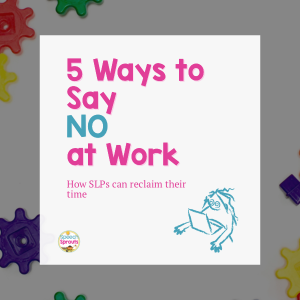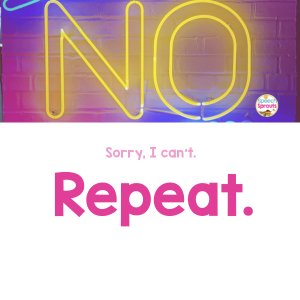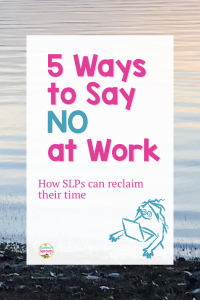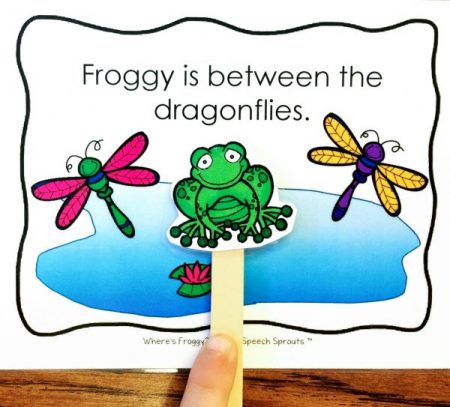
SLP’s: 5 Ways to Say NO at Work and Reclaim Your Time
Do you have a hard time saying no at work?
There is just not enough time for all the things.
Learn to say no!
Start by prioritizing tasks and requests.
- providing effective therapy for my students
- meeting IEP therapy times
- meeting legal timelines for evaluations and meetings
Five ways to say no to non-essential tasks.
1. You may need to say no to yourself.
Over-achiever? Learn to let some things go. Simplify.
- Make report templates. Provide the meat of the results, don’t write a book.
- Batch your work by focusing on one type of task at a time- do all your billing at once, prepare for all IEP meetings this month, test several kiddos in a row if you have time.
- Go no-prep. Notice I said effective therapy, not uber-creative, Pinterest-worthy therapy. I do love a fun craft or creating a fresh activity, but when you’re in a time crunch, go simple, no-prep and basic. How?
- Grab an open-ended game, a storybook or super simple activity and use it all day with every group. Modify it on the fly as needed to suit each group’s goals. An example of this would be my open-ended seasonal Speech Therapy Vocabulary Games, or no-prep activities like my mixed group Speech Therapy Activities and WH Questions, a board game, play dough or slime.
- Push-in. Try in-class therapy when there are several students in the same class. This works great for me with preschoolers and self-contained classes. You can see larger groups at once and model for the teachers as well.
- Pull out larger groups and do a story activity or a group game. My Bingo Riddles Games are fabulous for larger groups and handling doubled-up make-up sessions.
2. Say no to chatty colleagues who can’t take the hint.
These people don’t take the subtle hints that you’re busy and they eat up your precious free minutes. How do you handle that?
- Smile and tell them straight out you have a ton of work to get done.
- Turn away as they talk and keep typing, working, etc.
- If they don’t take the cue, stand up and leave… say you need to head to the office, run an errand, check something, ect. Head out the door and say see ya later.
3. Say no to special requests and events.
You may need to practice this one ahead of time. In the mirror, or out loud if needed until it feels natural.
4. Say no to extra campus duties.
This happens a lot in the schools and it’s tricky because you’re usually saying no to a principal or supervisor. You may be asked to cover a class when there is no sub, proctor a test, do a regular duty, participate in an extra event.
Set some boundaries, and have a response ready.
Be cautious and use your judgment here. Sometimes you may want or need to say yes due to circumstances. If you are ready to say no:
- Prepare ahead of time so you can have a reasonable and respectful response ready. Get the support of your special education supervisor, lead SLP, or whoever is responsible for seeing that therapy services are provided appropriately. Talk about your workload and explain that you have no time for makeup therapy and meeting paperwork timelines if asked to do extra duties- (if that’s the case). Ask for their support in opting out of extra duties.
- I currently have ___ (Insert your gigantic to-do list here) on my schedule. If I’m not able to do ___ today, the school will be out of legal compliance. Would ___ be able to help?
- Duties: My schedule is currently full, if I do ___ duty, I won’t be able to provide required therapy services and meet legal timelines.
- Let me check my schedule, I’ll get back to you by___.
- If you can provide an SLP to cover my required duties, I would be happy to help.
5. Say no to extra SLP duties.
Be professional and direct. Be empathic, give them a valid reason you are saying no and offer alternative solutions if you can. Show them a little gratitude for their faith in you, but…
“I know you need___ handled. I appreciate you thinking of me”
“If I take that on, I won’t be able to___.” (meet therapy time, complete evaluations, IEP meetings within timelines, complete billing, documentation.) Thank you for understanding.
“Please break down the most essential part of this, and how we will handle the tasks that will not fit in my schedule?
“I’ll need help, so will you be assigning/contracting another SLP to handle___?”
So you have a hard time saying no?
Watch this for some great advice How to say No.
How about 50 MORE ways? Love this guy!
Here’s my take when “No” just doesn’t work:
Ultimately, it’s the school’s duty to meet timelines by providing the personnel to meet requirements.
You’re pedaling as fast as you can, doing your best to keep up.
If you’re required to take on tasks that limit your ability to meet requirements, it’s not your fault, as long as your supervisors are fully aware of your workload and you have communicated what the consequences will be to your ability to provide therapy and meet timelines.
When that’s the case, do document your concerns respectfully in an email and keep a copy. (If it’s not in writing it didn’t happen!) You may need this later, to show you communicated your concerns and workload.
For example:
Thank you for meeting with me about ___. I understand that ___ is important. Unfortunately, as we discussed, by adding these additional duties to my current workload, I may not be able to ___(meet therapy times, meet timelines, complete documentation or billing in a timely fashion). With this in mind, it is my understanding that you are assigning me to ____ at this time. Is that correct? Thank you.
When I asked a group of SLPs in the trenches how they manage to say “no” they said:
- An interventionist ordered me to cover a teacher’s class during the day so the teacher could attend her child’s function. I said no, got into quite a spat with the campus admins, and ended up changing from that campus. It’s been great! I love my new schools and principals.
- Pam said: We always joke we need to give new SLPs a Big Mac that is pre-programmed to say “No, I am unable to do that.” No “sorry” and no excuses, just say no.
- Breanna said: When I’m told, “I scheduled (name)’s IEP before/after school.” I say, “Oh, I’m sorry, I’m not available that day. We can either reschedule or you can hold the IEP without me.” Only one person has ever asked me why.
- The best excuse I ever heard was “Oh, I have to go home after school and keep my cat company, he gets really lonely.” (Well…not sure I’d use that one!)
- Nijji said: Last year I said no to proctoring state tests. My AP was new to our school and she said, “The speech therapist at my old school did it.” I politely made eye contact and said, “I still have to meet IEP time for all the kids on my caseload.” Be polite but firm. I don’t think she’ll ask me this year.
- Susan said: I’ve always been sooo bad at saying no. I mostly say “I don’t have time on my calendar to ___. My next opening isn’t until ___.”
- Linda said: “I realized over time that it was okay to say no to extra responsibilities that took away from student hours or took up my personal time. I make sure I do one school-wide activity that doesn’t take up too much time. That way I can say, “I’m sorry, I’m already signed up for ___ and I can’t fit anything else in now.”
Don’t forget to say “yes” sometimes too.
Hang in there!







